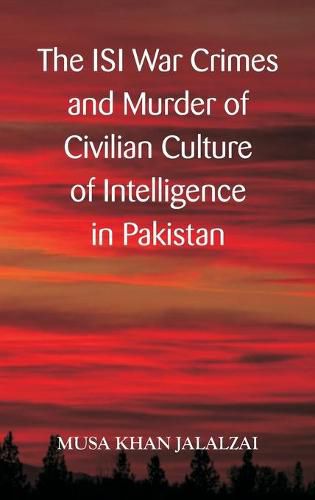Readings Newsletter
Become a Readings Member to make your shopping experience even easier.
Sign in or sign up for free!
You’re not far away from qualifying for FREE standard shipping within Australia
You’ve qualified for FREE standard shipping within Australia
The cart is loading…






This title is printed to order. This book may have been self-published. If so, we cannot guarantee the quality of the content. In the main most books will have gone through the editing process however some may not. We therefore suggest that you be aware of this before ordering this book. If in doubt check either the author or publisher’s details as we are unable to accept any returns unless they are faulty. Please contact us if you have any questions.
The perspicacity that ISI is a number one intelligence agency in South Asia is not accurate; the agency is weak, militarized and its national security approach is controversial. It collects intelligence in an untraditional manner, which leads policy makers in the wrong direction. Its intelligence officers are not so greatly educated and unable to use modern intelligence technology properly. There are thousands of volunteer informers who work for the agency in different environments but don’t even know the basic knowledge of intelligence information techniques. Their purveyed low-quality intelligence information led policy makers in the wrong direction-the reason that they view Afghanistan and India with hostile military glasses. The ISI does little to dispute its reputation as an omnipotent force. Fear is a powerful weapon. But talk of a ‘rogue agency’ is misplaced, and its abilities are frequently overestimated. While it is effective on street level, and seen by Western spy agencies as superior to its Indian rival, the Research and Analysis Wing (RAW), the ISI is not a professional service in the mould of the CIA or Britain’s MI6. The organization is afflicted by the same bungling and corruption as the rest of the Pakistani state. It has frequently lost control of its most dangerous assets-Puppet masters who can’t control their puppets, as Robert Grenier, a former CIA station chief in Islamabad, put it. And when it comes to analysis, the ISI has a poor record. ‘They saw everything through pre-determined ideological prisms, rather like the KBG during the Cold War, a senior British official who worked with the ISI for decades told me. 'Frankly, ’ he added. ‘None of their analysis was worth the paper it was written on’, it adds. The book titled, The Nine Lives of Pakistan . Section from the book of (The Nine Lives of Pakistan) British journalist Declan Walsh.
$9.00 standard shipping within Australia
FREE standard shipping within Australia for orders over $100.00
Express & International shipping calculated at checkout
This title is printed to order. This book may have been self-published. If so, we cannot guarantee the quality of the content. In the main most books will have gone through the editing process however some may not. We therefore suggest that you be aware of this before ordering this book. If in doubt check either the author or publisher’s details as we are unable to accept any returns unless they are faulty. Please contact us if you have any questions.
The perspicacity that ISI is a number one intelligence agency in South Asia is not accurate; the agency is weak, militarized and its national security approach is controversial. It collects intelligence in an untraditional manner, which leads policy makers in the wrong direction. Its intelligence officers are not so greatly educated and unable to use modern intelligence technology properly. There are thousands of volunteer informers who work for the agency in different environments but don’t even know the basic knowledge of intelligence information techniques. Their purveyed low-quality intelligence information led policy makers in the wrong direction-the reason that they view Afghanistan and India with hostile military glasses. The ISI does little to dispute its reputation as an omnipotent force. Fear is a powerful weapon. But talk of a ‘rogue agency’ is misplaced, and its abilities are frequently overestimated. While it is effective on street level, and seen by Western spy agencies as superior to its Indian rival, the Research and Analysis Wing (RAW), the ISI is not a professional service in the mould of the CIA or Britain’s MI6. The organization is afflicted by the same bungling and corruption as the rest of the Pakistani state. It has frequently lost control of its most dangerous assets-Puppet masters who can’t control their puppets, as Robert Grenier, a former CIA station chief in Islamabad, put it. And when it comes to analysis, the ISI has a poor record. ‘They saw everything through pre-determined ideological prisms, rather like the KBG during the Cold War, a senior British official who worked with the ISI for decades told me. 'Frankly, ’ he added. ‘None of their analysis was worth the paper it was written on’, it adds. The book titled, The Nine Lives of Pakistan . Section from the book of (The Nine Lives of Pakistan) British journalist Declan Walsh.